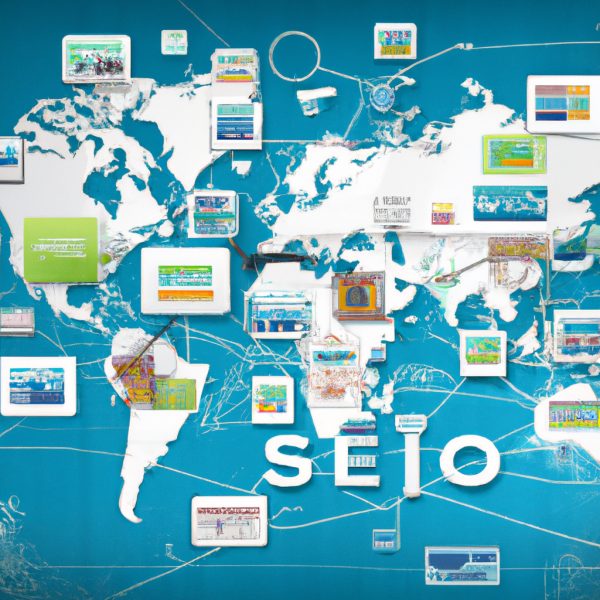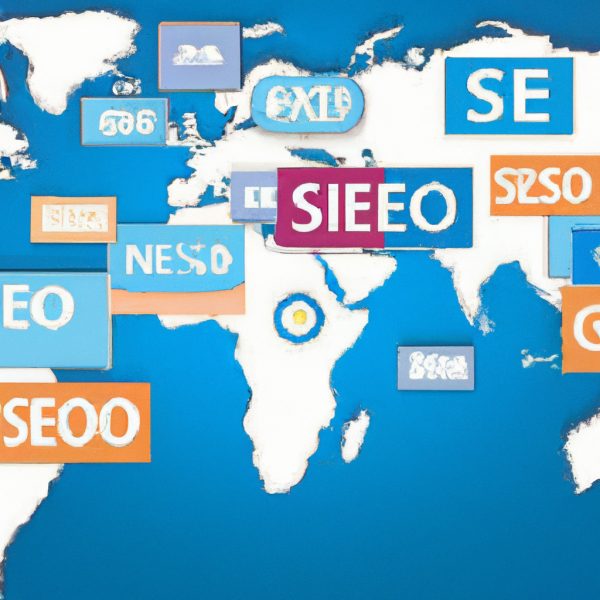International SEO is a crucial aspect of digital marketing that focuses on optimizing websites to attract and engage a global audience. It involves adapting content and keywords to target specific regions and languages, ensuring that search engines recognize the relevance of a website to users from different countries. By implementing international SEO strategies, businesses can expand their online presence and gain visibility in international markets, ultimately driving more traffic and generating higher conversion rates. This article explores the fundamentals of international SEO and highlights its significance in today’s globalized digital landscape. International SEO refers to the practice of optimizing a website’s visibility and performance in search engine results pages (SERPs) across different countries and languages. It involves implementing strategies and techniques to effectively target and reach international audiences, expand organic traffic, and tap into new business opportunities. International SEO is crucial for businesses looking to establish a global online presence and gain a competitive edge in the international market.
Importance of International SEO
Review contents
Reaching a Global Audience
One of the major advantages of international SEO is the ability to reach a global audience. By optimizing your website for different countries and languages, you can increase your visibility and attract targeted traffic from around the world. This allows you to expand your customer base and tap into new markets, opening up exciting opportunities for growth and expansion.
Increasing Organic Traffic
Implementing international SEO strategies can significantly boost organic traffic to your website. By optimizing your content for different languages and regions, you can improve your website’s visibility in relevant search results. This means that users searching for products or services in specific countries or languages are more likely to find your website, leading to increased organic traffic and potential conversions.
Expanding Business Opportunities
International SEO offers businesses the opportunity to expand their horizons and explore new business opportunities globally. By catering to different countries and languages, you can tap into untapped markets and gain a competitive advantage. This not only helps in increasing revenue but also diversifies your customer base, making your business more resilient to economic fluctuations in specific regions.
Gaining Competitive Advantage
In today’s globalized world, businesses face fierce competition not only in their local markets but also in international markets. Implementing effective international SEO strategies can help you gain a competitive advantage by ensuring that your website ranks high in relevant search results across different countries and languages. This increases your visibility, builds brand authority, and helps you stand out from your competitors, attracting more customers and driving conversions.
Key Components of International SEO
Keyword Research and Localization
Keyword research and localization are critical components of international SEO. It involves identifying the relevant keywords and search terms used by users in different countries and languages. By researching and optimizing for these keywords, you can ensure that your website appears in search results when users search for relevant products or services. Localizing keywords helps you understand the nuances and preferences of different regions, allowing you to tailor your content to the specific needs and interests of your target audience.
Hreflang Tags
Hreflang tags are HTML markup tags that indicate to search engines which language and location versions of a webpage should be displayed to users. They help search engines understand the language and country targeting of your content, ensuring that the right version is displayed to the right users. Implementing hreflang tags correctly is crucial for international SEO, as it helps search engines index and rank your website correctly for different languages and regions.
Multilingual Content
Creating multilingual content is essential for international SEO. It involves translating and adapting your website’s content to cater to different languages and cultures. A well-executed multilingual content strategy can significantly improve user experience, increase engagement, and drive conversions. It is important to ensure that the translated content is not only accurate but also culturally sensitive, providing a seamless experience for users in different countries.
Domain Structure and URL Localization
Choosing the right domain structure and localizing your URLs is an important aspect of international SEO. Depending on your business goals and budget, you can opt for different domain strategies, such as ccTLDs (country code top-level domains), subdomains, or subdirectories. Localizing your URLs by including the language or country code can help search engines understand and rank your website appropriately for different regions.
Technical SEO Considerations
Technical SEO plays a crucial role in international SEO. It involves optimizing various technical aspects of your website to ensure search engine accessibility and optimal performance across different countries and languages. This includes factors such as website loading speed, mobile optimization, structured data markup, XML sitemaps, and server location, among others. Paying attention to these technical considerations helps search engines crawl and index your website effectively, enhancing its visibility in international search results.
How to Implement International SEO
Identify Target Countries and Languages
The first step in implementing international SEO is to identify the target countries and languages you want to target. Consider your business goals, target audience, and market research to determine which countries and languages are most relevant to your business. This will help you prioritize your efforts and focus on optimizing for the regions that offer the greatest potential for growth and success.
Keyword Research and Localization
Conduct thorough keyword research for each target country and language to identify the most relevant and high-performing keywords. Localize your keyword research by using tools and resources that provide insights into local search trends, preferences, and competition. This will help you tailor your content and optimize your website for each specific market, increasing its visibility and relevance in search results.
Localization of Content
Once you have identified the target countries and languages, begin localizing your content accordingly. This involves translating and adapting your website’s content to cater to the linguistic and cultural preferences of each target market. Make sure the content is not only translated accurately but also localized to reflect local nuances, idioms, and cultural sensitivities. This helps to establish a connection with the local audience, enhance user experience, and improve the overall performance of your website.
Hreflang Implementation
Implement hreflang tags on your website to indicate the language and country targeting of each webpage. This helps search engines understand and display the appropriate version of your content to users in different locations. Make sure to implement hreflang tags correctly and consistently across your website to ensure accurate indexing and ranking for different languages and regions.
Mobile Optimization
Mobile optimization is crucial for international SEO, as mobile usage is increasingly dominant worldwide. Ensure that your website is optimized for mobile devices, providing a seamless and user-friendly experience for users across different regions. Implement responsive design, optimize page speed, and consider the specific mobile preferences and behaviors of your target audience to maximize mobile traffic and conversions.
International Link Building
Building high-quality and relevant backlinks from international sources is an important aspect of international SEO. It helps search engines recognize the authority and relevance of your website for different countries and languages. Focus on local link building strategies, such as guest blogging, influencer outreach, and collaborations with local businesses or organizations. This helps to improve your website’s visibility, credibility, and organic rankings in specific regions.
Monitoring and Tracking
Regularly monitor and track the performance of your international SEO efforts to identify areas for improvement and make data-driven decisions. Utilize tools such as Google Analytics, Google Search Console, and other SEO platforms to analyze key metrics, such as organic traffic, rankings, conversions, and user behavior. This valuable data will help you fine-tune your strategies, optimize your website, and stay on top of changing trends in international search markets.
Common Challenges in International SEO
Language and Cultural Differences
Navigating language and cultural differences can be a challenge in international SEO. Not only do you need to accurately translate your content, but you also need to ensure that it resonates with the local audience. Adapting your messaging, tone, and visuals to align with cultural preferences and sensitivities is crucial for establishing trust and building a strong connection with your international audience.
Local Competition
Expanding into international markets often means facing fierce competition from local businesses. It’s essential to conduct thorough market research to understand the competitive landscape and identify opportunities for differentiation. Tailor your SEO strategies accordingly to stand out from the competition and provide unique value to your target audience.
Technical Issues
International SEO often comes with technical challenges, especially when it comes to website structure, server location, and load times. Ensuring that your website is properly optimized for different countries and languages requires attention to detail and technical expertise. It’s important to work closely with your web development team or SEO professionals to overcome any technical hurdles that may arise.
Managing Multiple Websites
Operating multiple websites for different countries and languages can be complex and time-consuming. It’s essential to have a clear strategy for managing and updating these websites, ensuring that they are all optimized for search engines and provide a consistent user experience. Streamline your processes and consider using content management systems or localization platforms to simplify the management of your international websites.
Legal and Regulatory Compliance
Expanding into international markets often means dealing with different legal and regulatory requirements. It’s important to understand and comply with any local regulations related to data privacy, consumer protection, advertising, and other relevant areas. Failure to do so can result in legal consequences or damage to your brand reputation. Work with legal professionals familiar with international business laws to ensure compliance and mitigate any potential risks.
Best Practices for International SEO
Research Local Search Markets
Thoroughly research and understand the local search markets in your target countries. Gain insights into user behavior, preferences, search trends, and competition. This knowledge will help you tailor your SEO strategies to the specific needs and interests of your target audience, increasing your chances of success in international markets.
Optimize Content for Targeted Countries and Languages
Create and optimize content specifically for each targeted country and language. Translate your content accurately, and adapt it to suit the linguistic and cultural preferences of the local audience. Ensure that your content provides relevant and valuable information that resonates with users in each specific market, enhancing user experience and driving conversions.
Use Correct Hreflang Tags
Implement hreflang tags correctly and consistently across your website. Double-check that they are properly implemented in the HTML code and that the language and country targeting is accurate. This helps search engines understand and rank your website appropriately for different languages and regions, leading to improved visibility and organic traffic.
Implement Geo-Targeting and Language Targeting
Utilize geo-targeting and language targeting settings in your SEO tools and platforms. These settings allow you to specify the target countries and languages for your content, ensuring that it is displayed to the right users in relevant search results. This helps you optimize your website’s visibility and relevance for specific regions, maximizing your chances of attracting targeted traffic and conversions.
Choose the Right Domain Strategy
Carefully consider the domain strategy that best suits your international SEO goals and budget. Options include country code top-level domains (ccTLDs), subdomains, or subdirectories. Each option has its pros and cons, so evaluate them based on factors such as brand visibility, flexibility, and ease of localization. Choose a domain strategy that aligns with your business goals and supports your international SEO efforts effectively.
Ensure Fast Website Loading Speed
Website loading speed is crucial for international SEO. Users expect fast and seamless experiences, regardless of their location. Optimize your website’s loading speed by minimizing server response time, optimizing images and CSS files, and leveraging content delivery networks (CDNs). This helps to improve user experience and reduce bounce rates, positively impacting your website’s search engine rankings.
Build Local Backlinks
Build high-quality backlinks from local sources to enhance your website’s authority and relevance in specific regions. Focus on collaborating with local influencers, bloggers, or businesses to generate backlinks from reputable and relevant websites. This improves your website’s visibility, credibility, and organic rankings for targeted countries and languages.
Monitor Performance and Make Data-Driven Improvements
Regularly monitor and analyze the performance of your international SEO efforts. Utilize tools like Google Analytics, Google Search Console, and other SEO platforms to track key metrics, such as organic traffic, rankings, conversions, and user behavior. Leverage this valuable data to identify areas for improvement, make data-driven decisions, and optimize your website’s performance in international search markets.
International SEO Tools
Google Analytics
Google Analytics is a powerful web analytics tool that provides insights into website traffic, user behavior, conversions, and more. It helps you track and measure the impact of your international SEO efforts, providing valuable data to fine-tune your strategies and optimize your website’s performance.
Google Search Console
Google Search Console is a free tool provided by Google that helps you monitor, evaluate, and optimize your website’s presence in Google search results. It provides valuable data on website visibility, indexing, and search performance, allowing you to identify and address any issues or opportunities related to international SEO.
SEMRush
SEMRush is a comprehensive SEO platform that offers a wide range of tools and features for keyword research, competitor analysis, backlink monitoring, and more. It helps you identify the most relevant keywords for international SEO, track your website’s performance, and make informed decisions to improve your search rankings.
Moz
Moz is another popular SEO platform that provides various tools and resources to optimize your website’s visibility and rankings in search results. It offers features such as keyword research, site audits, backlink analysis, and more. Moz helps you uncover opportunities and challenges in international SEO, enabling you to make data-driven improvements to your website.
Ahrefs
Ahrefs is a comprehensive SEO platform that offers a range of tools and features for keyword research, backlink analysis, content optimizations, and more. It provides valuable insights into international search markets and helps you identify opportunities for growth and improvement.
Screaming Frog SEO Spider
Screaming Frog SEO Spider is a website crawler tool that helps you identify and fix technical SEO issues on your website. It provides valuable data on website structure, broken links, duplicate content, and more. This tool is essential for ensuring that your website is properly optimized for international SEO and search engine visibility.
Siteliner
Siteliner is a website analysis tool that helps you identify duplicate content, broken links, and other issues that may affect your website’s SEO performance. It provides valuable insights into your website’s structure and content, enabling you to make improvements that enhance your international SEO efforts.
Hreflang Generator Tool
An hreflang generator tool helps you automatically generate hreflang tags for your website. It simplifies the process of implementing hreflang tags correctly and consistently across your website, ensuring accurate language and country targeting.
Conclusion
International SEO is a crucial aspect of online marketing for businesses looking to expand their reach and tap into new markets globally. By implementing strategies to optimize for different countries and languages, businesses can reach a global audience, increase organic traffic, and gain a competitive advantage. Key components of international SEO include keyword research and localization, hreflang tags, multilingual content, domain structure and URL localization, and technical SEO considerations. By following best practices, businesses can overcome common challenges, leverage international SEO tools, and monitor performance to continuously improve their international SEO efforts.




























